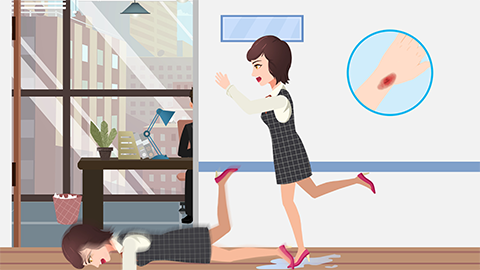Why does a woman in her 20s frequently stumble or fall while walking?
Generally, a woman in her 20s may be prone to tripping or falling while walking due to factors such as lack of attention, ill-fitting shoes, vestibular dysfunction, hypokalemia (low potassium levels), or sequelae of ankle ligament injuries. It is recommended to seek medical advice promptly, identify the underlying cause, and receive appropriate treatment under a doctor's guidance. Detailed explanations are as follows:

1. Lack of attention: Frequently looking at mobile phones or being lost in thought while walking can lead to inattention to the walking surface, resulting in delayed reactions and falls. Developing the habit of focusing while walking, reducing phone usage, and paying attention to the path ahead can help lower the risk of falling.
2. Ill-fitting shoes: Wearing high heels, shoes with overly slippery or loose soles can affect foot pressure distribution and balance, leading to unsteady gait. It is important to choose well-fitted shoes with non-slip soles and avoid wearing excessively high heels for prolonged periods to improve walking stability.
3. Vestibular dysfunction: Abnormalities in the inner ear’s vestibular system can impair balance perception, causing dizziness, loss of balance, and falls during walking, possibly accompanied by nausea. Patients may take medications such as betahistine mesylate tablets, difenidol hydrochloride tablets, or Ginkgo biloba extract tablets as prescribed by a physician to improve vestibular function.
4. Hypokalemia: An unbalanced diet or excessive dieting may lead to insufficient potassium intake, causing muscle weakness and limb numbness, which can affect walking balance. Patients may take potassium supplements such as potassium chloride sustained-release tablets, potassium citrate granules, or potassium magnesium aspartate tablets as directed by a healthcare provider.
5. Sequelae of ankle ligament injury: Previous ankle ligament injuries that did not fully heal can result in decreased joint stability, making it easy to sprain the ankle or fall while walking. In severe cases, surgical repair of the ankle ligaments may be required to strengthen the ligaments, restore joint stability, and reduce the likelihood of falling.
In daily life, it is important to stay focused while walking, wear appropriate footwear, and engage in regular balance training exercises such as standing on one leg or practicing yoga to enhance overall balance. Individuals with prior joint injuries should take preventive measures and avoid strenuous physical activities to minimize the risk of falling.





